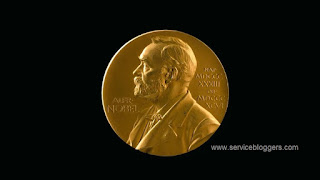(*Year: 1990) President Mikhail Sergeyevich Gorbachev (USSR) - for his leading role in the peace process which today characterizes important parts of the international community.
1991 Aung San Suu Kyi (Myanmar) - for her non-violent struggle for democracy and human rights.
1992 Author Rigoberta Menchú (Guatemala) - in recognition of her work for social justice and ethno-cultural reconciliation based on respect for the rights of indigenous peoples.
1993 President Nelson Mandela (South Africa) and former President Frederik Willem de Klerk (South Africa) - for their work for the peaceful termination of the apartheid regime, and for laying the foundations for a new democratic South Africa.
1994 PLO Chairman Yasser Arafat, Foreign Minister Shimon Peres (Israel) and Prime Minister Yitzhak Rabin (Israel) - for their efforts to create peace in the Middle East.
1995 Józef Rotblat (Poland/UK) and the Pugwash Conferences on Science and World Affairs - for their efforts to diminish the part played by nuclear arms in international politics and, in the longer run, to eliminate such arms.
1996 Carlos Felipe Ximenes Belo (East Timor) and José Ramos Horta (East Timor) - for their work towards a just and peaceful solution to the conflict in East Timor.
1997 International Campaign to Ban Landmines (ICBL) and Jody Williams - for their work for the banning and clearing of anti-personnel mines.
1998 John Hume and David Trimble (both Northern Ireland) - for their efforts to find a peaceful solution to the conflict in Northern Ireland.
1999 Médecins Sans Frontières, Brussels. in recognition of the organization's pioneering humanitarian work on several continents.
2000 President Kim Dae Jung (South Korea) - for his work for democracy and human rights in South Korea and in East Asia in general, and for peace and reconciliation with North Korea in particular.
2001 The United Nations and Secretary-General Kofi Annan (Ghana) - for their work for a better organized and more peaceful world.
2002 Jimmy Carter (USA) - former President of the United States - for his decades of untiring effort to find peaceful solutions to international conflicts, to advance democracy and human rights, and to promote economic and social development.
2003 Shirin Ebadi (شيرين عبادي) (Iran) - for her efforts for democracy and human rights. She has focused especially on the struggle for the rights of women and children.
2004 Wangari Maathai (Kenya) - for her contribution to sustainable development, democracy, ecology and peace.
2005 The International Atomic Energy Agency (IAEA) and Mohamed ElBaradei (محمد البرادعي) (Egypt) - for their efforts to prevent nuclear energy from being used for military purposes and to ensure that nuclear energy for peaceful purposes is used in the safest possible way.
2006 Muhammad Yunus and Grameen Bank - for their efforts to create economic and social development from below.
2007 Intergovernmental Panel on Climate Change (IPCC) and Albert Arnold Gore Jr. - for their efforts to build up and disseminate greater knowledge about man-made climate change, and to lay the foundations for the measures that are needed to counteract such change.
2008 Martti Ahtisaari - for his important efforts, on several continents and over more than three decades, to resolve international conflicts.
2009 Barack Obama - for his extraordinary efforts to strengthen international diplomacy and cooperation between peoples.
2010 Liu Xiaobo - for his long and non-violent struggle for fundamental human rights in China.
2011 Ellen Johnson-Sirleaf, Leymah Gbowee and Tawakkul Karman - for the security and women's rights.
2012 European Union - for having over six decades contributed to the advancement of peace and reconciliation, democracy and human rights in Europe.
2013 Organisation - for the Prohibition of Chemical Weapons for its work in destroying chemical weapons.
2014 Kailash Satyarthi (India) and Malala Yousafzai (Pakistan) - for their struggle against the suppression of children and young people and for the right of all children to education.
2015 Tunisian National Dialogue Quartet - for its decisive contribution to the building of a pluralistic democracy in Tunisia in the wake of the Jasmine Revolution of 2011.
2016 Juan Manuel Santos (Colombia) - for his resolute efforts to bring the country's more than 50-year-long civil war to an end, a war that has cost the lives of at least 220,000 Colombians and displaced close to six million people.
2017 International Campaign to Abolish Nuclear Weapon - for its work to show the humanitarian crisis of any use of nuclear weapon and for its ground-breaking efforts to achieve a treaty-based prohibition of such weapons.
2018 Denis Mukwege (DRC), Nadia Murad (Iraq) - for their efforts to end the use of sexual violence as weapon of war and armed conflict.
2019 Abiy Ahmed (Ethiopia) - for his work in ending the 20 year stalemate between Ethiopia and Eritrea.
2020 World Food Programme (United Nations) - for its efforts to combat hunger, for its contribution to bettering conditions for peace in conflict-affected areas and for acting as a driving force in efforts to prevent the use of hunger as a weapon of war and conflict.
2021 Dmitry Muratov (Russia) and Maria Ressa (The Philippines, United States) - for their efforts to safeguard freedom of expression, which is a precondition for democracy and lasting peace.
2022 The human rights advocate Ales Bialiatski from Belarus, the Russian human rights organisation Memorial and the Ukrainian human rights organisation Center for Civil Liberties.

No comments:
Post a Comment